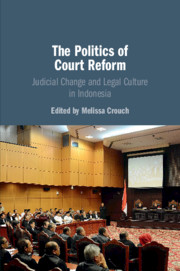Book contents
- The Politics of Court Reform
- The Politics of Court Reform
- Copyright page
- Contents
- Figures
- Tables
- Contributors
- Acknowledgements
- 1 The Judicial Reform Landscape in Indonesia
- Part I Continuity and Change in the General Court System
- Part II Specialised Courts Established under the New Order
- Part III Specialised Courts as Judicial Reform Strategy
- Part IV Courts and Rights
- 12 The Juvenile Courts and Children’s Rights
- 13 The Human Rights Courts
- 14 The Industrial Relations Court
- 15 The Media
- 16 Lev on the Links between Legal Evolution, Political Change and Activism
- Epilogue
- Glossary
- Bibliography
- Index
15 - The Media
Megaspectacles and Transparency in the Courts
from Part IV - Courts and Rights
Published online by Cambridge University Press: 30 August 2019
- The Politics of Court Reform
- The Politics of Court Reform
- Copyright page
- Contents
- Figures
- Tables
- Contributors
- Acknowledgements
- 1 The Judicial Reform Landscape in Indonesia
- Part I Continuity and Change in the General Court System
- Part II Specialised Courts Established under the New Order
- Part III Specialised Courts as Judicial Reform Strategy
- Part IV Courts and Rights
- 12 The Juvenile Courts and Children’s Rights
- 13 The Human Rights Courts
- 14 The Industrial Relations Court
- 15 The Media
- 16 Lev on the Links between Legal Evolution, Political Change and Activism
- Epilogue
- Glossary
- Bibliography
- Index
Summary
In an effort to encourage greater transparency in the judicial system, Indonesia often allows for television cameras in courtrooms, including live-to-air coverage. It has a long history of state-sponsored judicial ‘megaspectacles’, but in the post-New Order period a number of cases have transcended media platforms. Recent cases include intense foreign media reportage (such as the 2004 Schappelle Corby trial) and domestic sensations (such as 2016 Mirna Salihin’s Vietnamese coffee-cyanide murder case). In the case of the 2017 Ahok blasphemy trial, television cameras were first allowed to film because President ‘Jokowi’ argued for transparency, but later a decision was made to ban cameras and live reporting of his trial. There is debate over whether television cameras encourage transparent judgements or whether they provide a skewed version of the case to citizens. In this chapter we broadly discuss the role of the media in reporting court cases since reformasi, taking the case of television cameras in courtrooms as a case study. This research includes personal interviews with media practitioners, judges, and government officials. While Indonesia’s post-reformasi media practitioners are more critical of the judicial system than it was under Suharto, court reporting practices, including television coverage, remain highly problematic.
- Type
- Chapter
- Information
- The Politics of Court ReformJudicial Change and Legal Culture in Indonesia, pp. 334 - 352Publisher: Cambridge University PressPrint publication year: 2019
- 2
- Cited by



